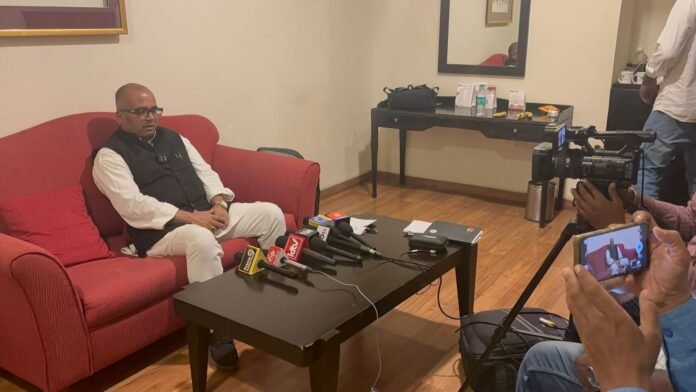The ongoing protests against the proposed Upper Siang Hydro Project in Arunachal Pradesh have sparked a growing national conversation about environmental concerns, tribal rights, and strategic infrastructure development. Amid the local unrest, political leader and Janata Party revivalist Navneet Chaturvedi has urged environmental activists and villagers to take a more structured and democratic approach in voicing their dissent.
The Upper Siang Hydro Project, a mega-dam initiative proposed by the National Hydroelectric Power Corporation (NHPC), has met with divided reactions in the region. While government officials emphasize its importance as a strategic asset crucial for national security, a section of local villagers and environmental activists are raising serious concerns about its ecological impact, displacement, and sustainability.
Speaking to journalists on this contentious issue, Chaturvedi addressed the rising tensions and called for a change in the manner of protest. “People can never win by fighting against the government—but they can certainly change the government,” he said, positioning himself as a facilitator of peaceful and effective resistance.
Chaturvedi revealed that several activists had approached him, requesting the support of the Janata Party in their opposition to the dam. Seizing this opportunity to re-establish the party’s relevance in northeast India, Chaturvedi offered a political platform to the local communities: “If the people of Arunachal truly want to see a change, they must organize themselves under a democratic structure. Join me under the Janata Party banner, and let us start a satyagraha inspired by Mahatma Gandhi.”
He emphasized that the current movement lacks leadership and direction. “Right now, the protests are scattered and reactive, yielding zero results. This unstructured resistance will not move the needle. What’s needed is unity, clarity, and disciplined strategy,” he said.
The Message: “No Vote If You Support the Dam”
While some factions of the local population remain neutral or even supportive of the government’s development narrative, a vocal segment has adopted slogans like “No survey, no dam” to resist even preliminary project activities. Chaturvedi, however, proposes a more politically targeted approach: “Instead of saying ‘no dam,’ say ‘no vote if you are with the dam.’ That is the true language of democracy.”
He elaborated, “Agitating against a strategic national project could be interpreted as a crime. Blocking roads without permission, holding unauthorized protests—all these could lead to legal action. But saying ‘we will not vote for you’ is never a crime. It is the people’s democratic right. Use that power. Show your strength during elections, not on the streets.”
Chaturvedi’s intervention comes at a time when Arunachal Pradesh is witnessing a delicate balance between national interest projects and tribal autonomy. The state’s rich biodiversity and unique tribal cultures have often been cited as reasons for caution when implementing infrastructure projects. Yet, the Central Government continues to push hydroelectric expansion in the Northeast as part of its broader strategic goals, particularly considering the proximity to international borders.
An Open Call to Local Leadership
When asked whether he believes the local villagers and activists would align with his party, Chaturvedi responded with measured clarity. “It’s their decision. Arunachal belongs to its tribal people. As an outsider, I cannot impose myself on them. They must rise for their own cause. If they choose the democratic path of peace and collective will, I will support them fully and guide them in any way I can.”
Chaturvedi’s words reflect an understanding of the political sensitivity surrounding Arunachal Pradesh. He stressed that political change should not be driven by emotional outbursts or violence, but by a disciplined civic movement. “Do not be swayed during elections by money or liquor,” he warned. “Stay united. That’s the only way the government will honour your demands.”
While his entry into Arunachal’s state politics remains speculative, Chaturvedi’s statements indicate a clear intent to shape the narrative around people-powered democratic movements. He is using the current unrest not only to offer strategic advice but to build political momentum around grassroots empowerment.
As tensions rise over the future of the Upper Siang Hydro Project, Chaturvedi’s call for Gandhian satyagraha presents a compelling alternative to confrontational activism. Whether the villagers and activists heed this call remains to be seen, but one thing is certain—the battle over the dam is no longer confined to the mountains of Arunachal. It is now a test case for how India reconciles development, democracy, and environmental justice in its most sensitive and strategic regions.


